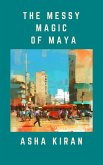There are stories that begin with a birth, and others that
begin with death. But Sola's begins with a decision that
is silent, sacrificial, and irrevocable. A woman steps across
an invisible threshold with her son's hand in hers, and
nothing is ever the same again.
This is not merely a tale of exile. It is the breathless
unfolding of a woman's life that was never hers to begin
with. Born into a world of silence, expectations, and
unspoken violence, Sola was taught early to bow her head,
to lower her gaze, and to fold her voice inside the hems
of household linens. But her spirit carried a spark; one
that refused to die, even when pressed beneath the weight
of forced marriage, motherhood, betrayal, and the shame
imposed by others.
In Azizam, we follow the contours of memory:
a jasmine-scented courtyard in Diyar, the shadowed
corridors of a loveless home, the stolen glances in a
forbidden garden, the terror of escape, and the fragile hope
flickering in immigration shelters. Through prose as lyrical
as it is raw, this novel maps a geography of loss, and of the
quiet revolution born in a woman's refusal to forget who
she truly is.
Sola's journey is one that many women know too well
but are rarely allowed to speak. Here, Manaz Badian lends
voice to the voiceless and light to those buried in shadow.
This story is not just Sola's. It belongs to every woman who
has loved despite the law, who has fled despite the fear, and
who has written her truth in margins and whispers.
This book is an act of remembrance. A fire carried across
borders. A testament that even in exile, one can bloom.
Let it begin.
begin with death. But Sola's begins with a decision that
is silent, sacrificial, and irrevocable. A woman steps across
an invisible threshold with her son's hand in hers, and
nothing is ever the same again.
This is not merely a tale of exile. It is the breathless
unfolding of a woman's life that was never hers to begin
with. Born into a world of silence, expectations, and
unspoken violence, Sola was taught early to bow her head,
to lower her gaze, and to fold her voice inside the hems
of household linens. But her spirit carried a spark; one
that refused to die, even when pressed beneath the weight
of forced marriage, motherhood, betrayal, and the shame
imposed by others.
In Azizam, we follow the contours of memory:
a jasmine-scented courtyard in Diyar, the shadowed
corridors of a loveless home, the stolen glances in a
forbidden garden, the terror of escape, and the fragile hope
flickering in immigration shelters. Through prose as lyrical
as it is raw, this novel maps a geography of loss, and of the
quiet revolution born in a woman's refusal to forget who
she truly is.
Sola's journey is one that many women know too well
but are rarely allowed to speak. Here, Manaz Badian lends
voice to the voiceless and light to those buried in shadow.
This story is not just Sola's. It belongs to every woman who
has loved despite the law, who has fled despite the fear, and
who has written her truth in margins and whispers.
This book is an act of remembrance. A fire carried across
borders. A testament that even in exile, one can bloom.
Let it begin.
Dieser Download kann aus rechtlichen Gründen nur mit Rechnungsadresse in A, D ausgeliefert werden.









